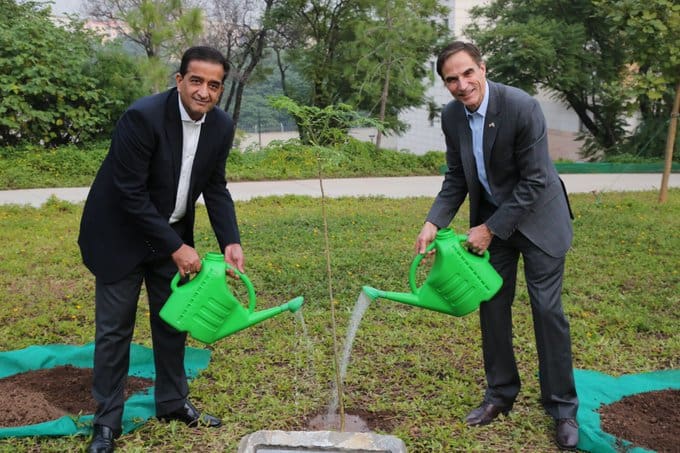ISLAMABAD – United States Ambassador to Pakistan Paul W. Jones and Adviser to Prime Minister on Climate Change Malik Amin Aslam planted a Moringa tree near the US Embassy’s Chancery building as a part of Pakistan’s “Ten Billion Tree Tsunami” initiative.
Speaking on the occasion, Ambassador, Paul W. Jones said the U.S Embassy saved 520 trees when the compound was built and planted 513 new trees and 2,800 new shrubs.
He also emphasized the state-of-the-art environmental features of the U.S Embassy compound that earned it a Leadership in Energy and Environmental Design (LEED) Silver Certification, including solar lighting, energy-efficient building materials and a state-of-the-art water management system.
The ambassador said “We all have a role to play in caring for our environment. The embassy and Ministry of Climate Change have planted this tree mainly to contribute to Pakistan’s “Ten Billion Tree Tsunami” afforestation initiative.
Speaking on the occasion, Advisor to Prime Minister on Climate Change, Malik Amin Aslam thanked the ambassador for attaching great importance to the ten billion tree initiative of the government through contributing to it.
He mentioned the five-point agenda of the present government which include 10 billion tree tsunami, banning single-use plastic ban, Clean Green Index to change behaviour on waste management, Electric Vehicle Policy and Recharge Pakistan project on ecosystem restoration which will help achieve the goal of clean and green Pakistan.
Indigenous to South Asia, the Moringa tree is hardy, fast-growing and consumes little water. Many cultures use the leaves and seeds of Moringa trees for their nutritional and medicinal properties, including in traditional remedies for inflammation, infection, headache, anemia and fever.














